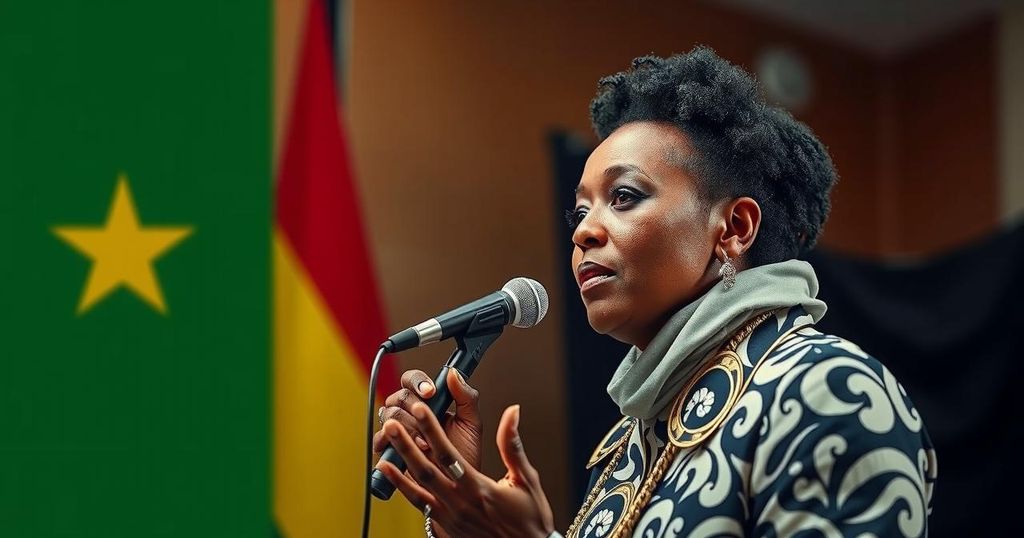Politics
2024 ELECTIONS, AFRICA, AFRICAN NATIONAL CONGRESS, BRITAIN, DEMOCRACY, ELECTIONS, ELECTORAL PROCESS, GOVERNANCE, GOVERNMENT, INDEPENDENT PATRIOTS FOR CHANGE, IPC, ITULA, NANDI - NDAITWAH, NET, NEW INDEPENDENT PATRIOTS FOR CHANGE, NEWCASTLE, SOUTH AFRICA, SOUTHERN AFRICA, SWAPO
Jamal Walker
0 Comments
Namibia Elects Its First Female President Amid Election Disputes
Namibia has elected its first female president, Netumbo Nandi-Ndaitwah, who won with 57% of the votes. This consolidates the ruling Swapo party’s power for over 34 years, despite allegations of irregularities from opposition parties. Nandi-Ndaitwah’s victory stands out regionally as incumbent parties face growing discontent among younger voters.
Namibia has made history by electing its first female president, Netumbo Nandi-Ndaitwah, who secured victory with 57% of the votes in the recent presidential elections. This outcome solidifies the ruling Swapo party’s dominance for over three decades since the nation’s independence from apartheid South Africa in 1990. Following the announcement of the results, President Nandi-Ndaitwah expressed her gratitude, emphasizing that “the Namibian nation has voted for peace and stability.”
At the age of 72, Nandi-Ndaitwah has had a long career in politics, previously serving as foreign minister and more recently as vice-president. Her ascendancy to the presidency followed the death of President Hage Geingob while in office. Despite her impressive victory, the elections were marred by technical challenges; opposition parties alleged irregularities, including insufficient ballot papers, and they are seeking to contest the election results in court.
Panduleni Itula, the leader of the Independent Patriots for Change (IPC), finished second with 25.5% of the vote. Itula, who returned to Namibia after practicing dentistry in the United Kingdom, saw a decline in votes compared to his performance in the previous election. In terms of parliamentary support, Swapo’s representation fell to 53%, while IPC gained traction with 20% of the votes, indicating a shift in the political landscape.
Nandi-Ndaitwah’s victory contrasts with a regional trend, where incumbent liberation movements have faced significant challenges from youthful voters. Notably, 2023 saw substantial electoral losses for South Africa’s African National Congress and political upheavals in Botswana and Mozambique, demonstrating a broader dissatisfaction within the region’s electorate.
The recent presidential elections in Namibia marked a significant turning point in the country’s political landscape, particularly with the election of its first female leader, Netumbo Nandi-Ndaitwah. Namibia has been under the rule of the Swapo party since its independence, making this victory a noteworthy achievement for women in leadership roles within the region. Additionally, the elections highlighted ongoing challenges and tensions between ruling parties and opposition groups amidst allegations of electoral irregularities, reflecting a growing discontent among voters, particularly the youth, towards long-standing leadership in southern Africa.
In conclusion, the election of Netumbo Nandi-Ndaitwah as Namibia’s first female president represents both a historic milestone for gender representation in leadership and a continuation of Swapo’s lengthy tenure in power. However, the election process faced significant opposition challenges and allegations of inconsistencies, suggesting a fractious political environment that may shape future governance. Nandi-Ndaitwah’s leadership could prove pivotal in addressing these challenges while aiming for stability and progress in Namibian society.
Original Source: www.theguardian.com




Post Comment